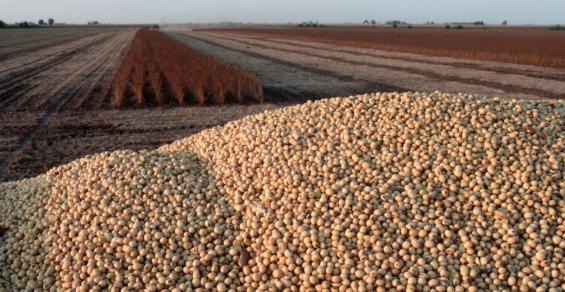Farmers will find an opportunity to diversify soybean marketing plans with a new processing facility.
Aaron Porter exports the majority of his soybean crop. Then four years ago, as China placed tariffs on American-grown soybeans during a trade war, he realized that single-focused marketing plan was not sustainable.
“Typically, everything here flows toward the river and down to the Gulf of Mexico for export,” the Stoddard County soybean grower says. “It is nice to have that market opportunity, but after the trade war under the past administration, we found we can’t always count on that export market and needed to try to find ways to use those beans domestically for food, feed and fuel markets.”
To date, the Biden administration has not lifted the tariffs. So, when Cargill started looking at southeast Missouri to build its latest soybean processing facility, Porter saw an opportunity to expand his marketing strategy and add value to his crop.
He and other soybean growers started leaning into the process of securing the plant, and it paid off.
Process close to home
Cargill recently unveiled plans to build a new soybean processing facility in Pemiscot County, near Hayti and Caruthersville in an area known as the Bootheel of Missouri.
While the new plant, scheduled to be operational by 2026, will still support global demand, Tim Coppage, regional commercial lead for Cargill Agricultural Supply Chain North America, says it will focus on growing U.S. supply.
“Cargill’s new facility, with its location on the Mississippi river, will operate year-round and provide farmers opportunity to take advantage of increased domestic demand versus relying solely on seasonal exports,” he says. “Access to both river and rail will provide more flexibility and market access for farmers.”
The facility will be the first of its kind for southeast Missouri where the nine-county area — plus southern Illinois, western Kentucky, western Tennessee and northern Arkansas — have an annual soybean production capacity of nearly 62 million bushels.
Gary Wheeler, Missouri Soybeans CEO and executive director, was born and raised in the Bootheel. “I know firsthand this is a great opportunity for our soybean farmers and local community,” he says. “Missouri Soybeans has been working collaboratively with several partners for more than two years to achieve this lofty goal and create a needed market for their soybeans.”
According to Wheeler, the state crushes about 7% of U.S. soybeans. Cargill will add to the current state soybean crush capacity of about 4.3 million tons annually, increasing it to about 17,000 tons per day or 6.2 million tons annually. “That’s about 228 million bushels total crush in-state,” he adds.
Expand market opportunities
The new plant offers more options for Porter’s soybeans.
They can be processed into soybean meal and sent down the river for export at a cheaper cost or used domestically. “There’s a lot of poultry producers in Arkansas and the East,” he explains, “and meal is a high-quality, low-cost feed product for them.”
The plant can also add value to the soybean by using it in the fuel space. “With the increase in demand for renewable, sustainable diesel, especially on the West Coast and in the Northeast, the oil can be used to produce biodiesel,” Porter explains.
Another option is to offer oil to the food industry, especially given the shortage of canola on the market.
Any of these markets helps diversify marketing opportunities for farmers in the region. Porter says some may consider increasing soybean acres in the future.
This area of Missouri is capable of growing corn, soybeans, cotton and rice. Farmers may add soybeans to their crop rotation on a more regular basis when the Cargill plant becomes operational.
Lower transportation costs for some, along with the reduced input requirements, make soybeans a cheaper crop to produce and a good return on investment for farmers, says Porter, who serves as vice chair of the Missouri Soybean Merchandising Council. “Our mission for the council is to increase profitability for Missouri’s farmers through their checkoff.”
The Cargill plant not only benefits farmers, he notes, but also the entire Bootheel of Missouri.
Improve the region
Counties and families often struggle to make ends meet in this region of southeast Missouri.
The Cargill plant is slated for Pemiscot County. According to the Missouri Community Action Network, a group that looks at poverty in the state, this county has the highest percentage of population living in poverty at 29%, followed by Mississippi and Dunklin counties at just over 26%.
According to Missouri Lt. Gov. Mike Kehoe, the addition of the Cargill plant “will expand the $94 billion economic impact of Missouri agriculture, accelerate economic development and enhance workforce opportunities in the Bootheel.”
The facility will bring about 45 full-time jobs to the area. “It is going to be good for our local county governments, businesses and school districts,” Porter says. “That is what we want for our area, our local communities.”
Cargill plans to break ground on the project early next year.




